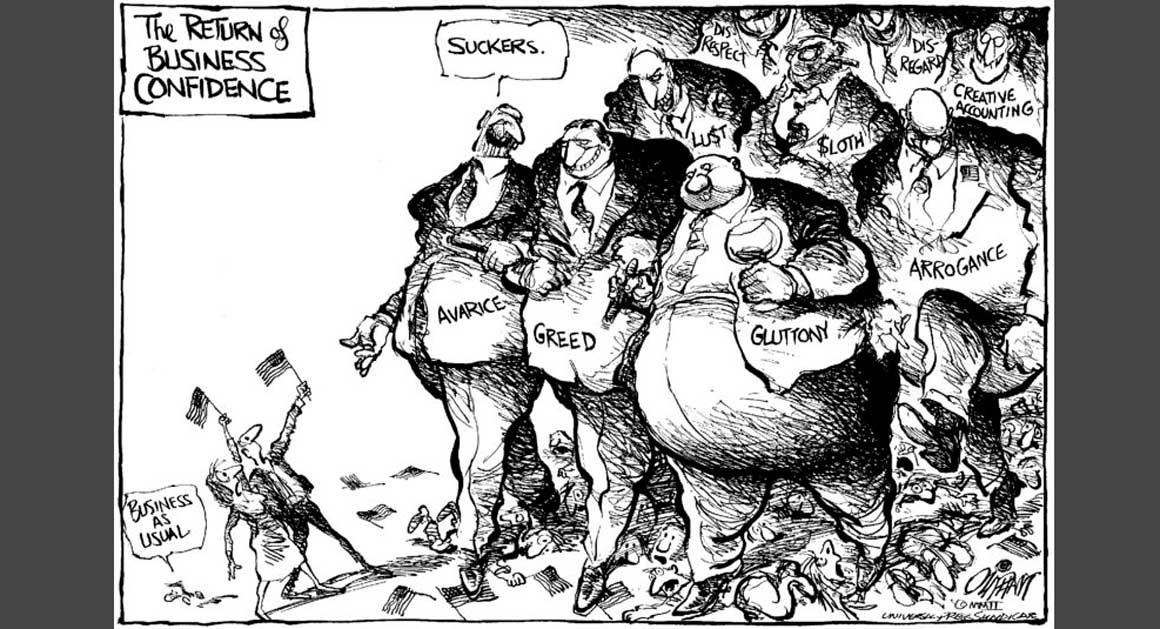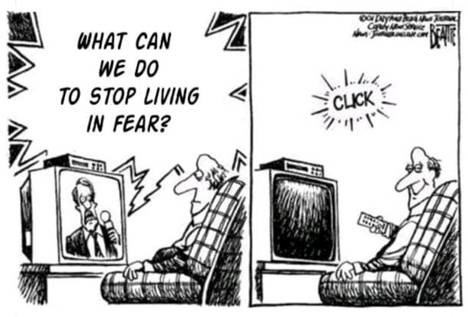06 Sep Plutocrats and Plutocats*
Plutocrats and Plutocats
A “plutocrat” is a person whose wealth gives him power – put simply, a “plutocrat” is a very, very rich person. Recently, however, the media and politicians have begun using the term “plutocrat” negatively pointedly … as a disparagement, a label that they often employ to refer to greedy moguls who in one way or another have either earned or deployed their riches for immoral purposes. As a consequence, calling someone a “plutocrat” is coming to mean that he is tarred with a label that equates him to an abuser of wealth, someone who received and uses his money dishonestly – whether through a corrupt business or for corrupt purposes. “Plutocrat” therefore is a rhetorical term packed with connotations. It is becoming a badge of dishonor. In the opinion of the The Lonely Realist, a more appropriate term for a morally corrupt fat cat would be “plutocat,” connoting a wealthy tycoon in the image of an early 20th Century monopolist (or, if a politician, in the image of a Tammany Hall boss) … like that caricatured below:


Using the label “plutocrat” to tar all rich people is a sign of the times rather than an accurate depiction of the billionaire class …, although there are exceptions. (Compare, for example, “A Delicate Balancing Act” in the May 29th TLR and “The Evil of Private Equity” in the August 16th TLR with “What is the Meaning of American Capitalism?” in the August 23rd TLR.)
“A Delicate Balancing Act” in the May 29th TLR discussed a New York Times editorial entitled “Charity Won’t Solve Student Debt,” which took to task Robert Smith, the founder, chairman and CEO of Vista Equity Partners, a private equity firm, who had announced during his commencement address at Morehouse College that he would repay the student loans burdening the 396 men in the 2019 graduating class. The editorial made the point that Smith, being the Times’ private-equity-plutocat-of-the-day, had amassed a great fortune, in part because the federal government hadn’t taxed him … sufficiently (which is what apparently made Smith a “bad-guy plutocrat”). The Times article drew a parallel to Andrew Carnegie who had built 1,689 public libraries, stating that many of those libraries continue to be celebrated as monumental works of philanthropy although they instead should be viewed “as monuments to the failure of public policy. The United States could have built a lot more libraries by taxing the income of Carnegie and his fellow Gilded Age plutocrats…. Now history is repeating itself. A new generation of plutocrats has amassed great fortunes…. Americans once again are reduced to applauding acts of philanthropy necessitated by failures of policy.”
TLR disagreed with the position taken in the Times editorial and defended Mr. Smith and other successful private equity entrepreneurs who had earned their riches by engaging in beneficial applications of modern American capitalism and used their fortunes to enhance, and not detract from, the lives of their fellow Americans … and had not engaged in any form of immoral behavior, least of all the types of inhuman behavior adopted by Carnegie. Carnegie worked his steelworkers to death, literally, 12 hours/day, 7 days/week, fired them when their age affected their performance (generally before the age of 40), and ignored workplace health and safety, resulting in unconscionably high accident rates and illnesses, many fatal. Despite his great philanthropies, Carnegie’s “plutocatic” immoralities made him then, and makes him now, the poster-plutocrat plutocat for media critics. The analogy that the Times drew between Carnegie’s wealth and Smith’s was accurate, as was the extent of their respective philanthropies. However, drawing a parallel between them based solely on their sources of wealth is unjust misplaced …, and not by accident. In today’s populist times, the media regularly paint “plutocrats” with the broad brush of immorality … whether or not the label has validity.
In a January 2019 column in The New Yorker entitled “Don’t Underestimate Elizabeth Warren and her Populist Message,” John Cassidy compared Elizabeth Warren to William Jennings Bryan, another engaging populist, writing that Warren inveighs “against the trusts, the plutocrats, and their corrupt political allies,” adding that “the essence of her case is an ethical one: many aspects of modern American capitalism and democracy are fundamentally immoral….”
American Capitalism is “fundamentally immoral”? So is America’s democracy? Are those really legitimate questions? If so, does that mean that America has been doing it all wrong for … centuries? TLR believes otherwise. See, for example, “What is the Meaning of American Capitalism?” in the August 23rd TLR.
Like the New York Times, as part of her proposals in the Stop Wall Street Looting Act of 2019, Warren wants to put an end to private equity investing. Her goal, as stated in “My Plan to Rein in Wall Street,” is “[t]o raise wages, help small businesses, and spur economic growth, [by shutting] down the Wall Street giveaways and rein[ing] in the financial industry so that it stops sucking money out of the rest of the economy.” Because Warren is running for President, her proposals naturally are designed to appeal to her populist base in a time of extreme populism. To support them, she highlights anecdotal situations and larger-than-life characters (some of whom bear surprising resemblances to morally-corrupt fictional characters like Gordon Gekko) who, by definition, are filthy rich “bad guys” who have reached previously-unheard-of – and unacceptable-to-many – levels of wealth. (TLR addressed Warren’s clarion call against Wall Street Looting in “The Evil of Private Equity” in the August 16th TLR.) The problem for both politicians and the media is to distinguish between “plutocrats” who have made, and who continue to make, their money the old-fashioned way – they earn it by building businesses and using their wealth to fund morally-sound businesses and charitable causes (much as Mr. Smith did) –, and “plutocats” like Carnegie whose moral foundations are despicable questionable.
Rather than painting the entire “plutocrat” class with an immorality brush, as Warren apparently is intent on doing, a better approach would be to target “plutocats” who use their wealth to amass power and use that power to exercise undue influence over government and the rights of the majority. Unduly influencing government has become far more common during the second decade of the 21st Century because of the 2010 Supreme Court decision in Citizens United v. Federal Election Commission, where the Court in a 5-4 opinion held that the First Amendment to the Constitution, which guarantees free speech, prohibits the government from restricting expenditures for political communications and lobbying – often another term for vote buying. Citizens United gave free rein to “plutocats” to pursue their political and policy agendas. Two who took that as license and who appropriately should be labeled “plutocats” are Charles Koch and his brother, David (who recently passed away).
The Koch brothers are the owners of Koch Industries, a huge global force in energy, chemicals, natural resources and a diverse range of other businesses and industries. Among their many endeavors, the Koch brothers have spent enormous sums to oppose regulations, unions and entitlements that could adversely impact their businesses. In so doing, their goal has been to push the Republican Party to the right and push government as far as possible away from Koch Industries centralization and towards non-interference in Koch Industries American industry, in part by ensuring maximal private property rights – in many ways by advocating an anarchical approach to American governance. That, of course, is their Constitutional right …, although many believe they have abused that right by using their vast fortune – estimated to exceed $50 billion – to buy unduly influence government and elected officials …, perhaps because their lobbying and electoral efforts have been so successful. However, that has not been the primary focus of Koch criticism. The most adverse reaction to any of the Koch brothers’ efforts has arisen from their financing of opposition to the scientific conclusion that the earth is warming. As reported in The Economist, the Kochs have led a disinformation campaign by “fund[ing] lobbyists, junk scientists and conspiracy theorists to propagate an alternative reality in which climate science is always contestable, and any policy response to it a socialist power-grab…. No amount of charity can negate the damage the brothers have done to Americans’ trust in expert opinion, as well as to the environment.” That campaign also has been enormously successful and, in addition to choking off environmental action at almost all levels of government, has been enormously beneficial to Koch Industries. Although there is no reason that the Koch brothers, like Carnegie, shouldn’t be praised for making major philanthropic contributions, also like Carnegie they can be faulted for causing irreparable harm to core American values, to America’s ecology and to Americans’ health, not in the same ways as Carnegie, but in more durable ones. Per The Economist, “[T]he brothers helped corrupt the American right, mislead the public and destroy a healthy bipartisan consensus on the [climate change] issue.”
There accordingly is a difference between a Robert Smith “plutocrat” and a Carnegie-Koch “plutocat,” and it would be prudent for Congress to address that difference in a bipartisan manner rather than with the 360-degree shotgun approach that Warren advocates. Although the Koch brothers wielded significant political, social and economic influence before Citizens United, their vast wealth now provides them with a far greater ability to unilaterally change the course of American history. No one or two persons, no minority, and no small group of plutocat-Americans should have that ability.
Finally (from good friends)

Angry Wife: “I should have married the devil. He would make a better husband than you!”
Hubby: “They would have arrested you! Marriage between relatives is illegal in this State.”
*┬® Copyright 2019 by William Natbony. All rights reserved.



No Comments